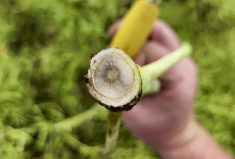In past columns I’ve written about research levies and wheat industry associations. Today: canola.
You might be asking, “Why are there so many organizations with ‘canola’ in their name?” Here’s a quick summary.
Provincial canola organizations
If you want to get involved in canola research and policy, start by paying attention to your local provincial organization. Alberta, Manitoba and Saskatchewan each have their own farmer-led commodity associations solely devoted to canola. These are funded by your refundable levies of $1 per tonne of canola sold ($0.75 for SaskCanola). Each of these associations funds some research, extension and policy work.
Read Also

Health hazards are often overlooked risks on the farm
While quite different from the dangers posed by farm machinery, hazards such as loud noise or sun exposure require the same proactive attention, the Canadian Agricultural Safety Association says.
In Alberta, the group is called the Alberta Canola Producers Commission. It started in 1989 — Alberta’s first refundable checkoff producer organization. It runs with a 12*-person board of directors: a chair, a vice-chair and one representative from each of 12 regions. Lee Markert, a farmer from Vulcan, Alta., became chair at the end of January. Ward Toma is the general manager at the Edmonton office.
In Saskatchewan, the job is handled by SaskCanola (more formally known as the Saskatchewan Canola Development Commission). This group has been running since 1991. It’s governed by an eight-member elected board. The current chair is Esterhazy farmer Dale Leftwich. Janice Tranberg is the executive director in the Saskatoon office.
In January I sat in on the SaskCanola annual meeting in Saskatoon. While the meeting was well attended and there was a couple of informative presentations and general congeniality, there wasn’t a lot of discussion or debate. One farmer/member made a pre-written statement about component pricing (he believed farmers are leaving money on the table by not demanding a system or premiums and discounts based on canola oil content.) But this topic had been addressed by SaskCanola staff, and no other farmers made comments.
Not only were there no entertaining arguments, when outgoing board chair Franck Groeneweg (a farmer from Edgeley, Sask.) got a little choked up explaining how much he’d enjoyed being part of the executive. I was worried the room might break out in a group hug. I’m not sure if this lack of discussion is the sign of a profitable, stable industry where everyone is happy, a demonstration of apathy, or just a mark of management that ensures all debates are held behind closed doors.
The Manitoba Canola Growers started as a voluntary membership association in 1982, but moved to a refundable checkoff in 1996. The Manitoba chair is Ed Rempel from Starbuck, Man., and its Winnipeg office is managed by executive manager Bill Ross.
The table at the bottom lists key information from the 2014 annual reports of all three of these organizations. They don’t use a common accounting method, so the research and administration numbers may not exactly compare apples to apples.
The national groups
There are two national canola groups: The Canola Council of Canada and the Canadian Canola Growers Association, each with its own board, staff and offices.
Why two? They have different goals and different funders.
The Canola Growers is a farmer-run group — a national ag policy organization. It’s funded by the three provincial canola groups, with additional funds from the Ontario Canola Growers and the B.C. Grain Producers Association. It’s run by farmers appointed by the provincial canola organizations. The current chair is Brett Halstead from Nokomis, Sask.
This organization doesn’t fund extension or research. It runs the Cash Advance program and does ag policy work. One great example of its policy work is their publication: “A Practical Guide to Navigate Grain Contracts,” written to help farmers know what to look for in grain company contracts when they sell canola. This sort of publication would only be published by an organization solely funded by farmers.
The other national group, the Canola Council of Canada, is quite different. Its website claims that it’s the “first industry association in Canada to encompass all links in the value chain.” It’s funded by the three provincial canola associations, but also funded by canola exporters, processors, and companies selling canola inputs like BASF, Bayer, Monsanto, Dupont Pioneer and Syngenta. Currently, the chair is Terry Youzwa, a SaskCanola director and farmer from Nipawin, Sask. (NOTE: As of March 5, the newly elected chair is Brian Conn, vice president, Canadian oilseeds with Louis Dreyfus Commodities Canada.)
Having all of these interests working together in one room drives a lot of great industry and market development. And, with corporate contributions, the Canola Council has the financial resources to fund a lot of strong agronomic and research programs.
But, you’ll notice that many of the council’s goals and strategies revolve around increasing canola yield (rather than maximizing net farm income from canola), or increasing total canola industry profits (versus farmer profits). Fair enough. They still offer a lot of great agronomic advice, and we won’t prosper on the farm if the rest of the industry can’t make a buck.
*note: this article originally, incorrectly, said there were 14 members. Thanks to the Alberta Canola Producers Commission for noting this error.















